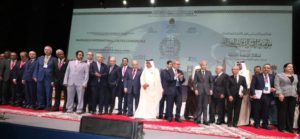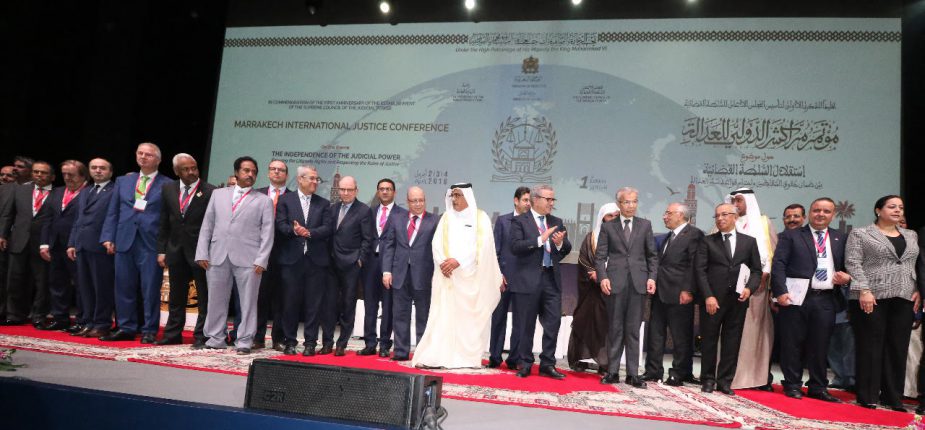 King Mohammed VI has stressed the importance of the independence of the judiciary system, saying it is the bedrock of the rule of law and the main driver of development.
King Mohammed VI has stressed the importance of the independence of the judiciary system, saying it is the bedrock of the rule of law and the main driver of development.
In a message addressed to participants in a high-level conference, convened Monday in Marrakech under the theme “The independence of the judiciary: guaranteeing the rights of litigants and upholding the principles of justice”, the Moroccan Sovereign said justice independence safeguards rights and freedoms, promotes development and protects society.
Morocco has been actively seeking to upgrade its judicial system in a bid to respond to the concerns of citizens, satisfy the needs of litigants, fulfil the aspirations of society and meet the requirements of our time, added the Monarch in his message that was read out by royal advisor Abdellatif Menouni.
Convinced that the independence of the judiciary is of utmost importance and given the role it plays in the emergence of states committed to the rule of law, “my country has sought to lay the foundations for judicial independence, taking the necessary institutional, legislative and practical measures to that end”, stressed the King.
“I was particularly keen to make sure the separation of powers was expressly enshrined in the Constitution. The latter also stipulates that a Higher Council of the Judiciary – chaired by the Sovereign and composed of legal and judicial experts as well as elected judges – is to be set up as an independent constitutional body which ensures that the guarantees provided to judges are respected and which manages judges’ professional careers”, said King Mohammed VI.
The Moroccan Constitution prohibits any interference in the cases being prosecuted, and the law provides for sanctions against any attempt to influence judges. Moreover, the Constitution stipulates that any failure by a judge to uphold his or her obligations with respect to the independence and impartiality of the judiciary would be considered a serious professional violation, which could entail criminal prosecution, underlined the royal message.
The Moroccan Constitution lays down provisions for upholding the rights of litigants and ensures the proper administration of justice. It confirms the judge’s role in terms of protecting the rights, freedoms and judicial security of individuals and groups. It also guarantees not only a citizen’s right to take legal action, but also the presumption of innocence as well as the right to a fair trial within a reasonable timeframe, the message stated further.
The Sovereign said he wanted to see these are constitutional principles reflected in a national charter for the reform of the judicial system. The preparation of that charter, which includes a range of legislative, organizational and practical reforms and which was developed using an extensive participatory approach, was entrusted to a group of eminent judges, lawyers, judicial experts and professionals from the justice system.
King Mohammed VI recalled, in this regard, the legal texts adopted in Morocco, particularly the organic laws relating to the Higher Council of the Judicial Power and the Statute of Judges, in addition to the legislation which transferred the supervision of the Office of the Public Prosecutor from the Minister of Justice to the Attorney General at the Court of Cassation.
Through this collective initiative, “my country has made important strides towards completing the institutional framework for running the judicial system”, said the Monarch, expressing hope that these drives will speed up the implementation of other relevant measures set out in the charter to update legislation and improve the functioning and performance of the judiciary, thus enhancing its independence, in keeping with the Kingdom’s Constitution.
As the guarantor of the independence of the judiciary, “I seek to make sure that independence – as enshrined in the Constitution – serves the citizen, enhances the rule of law and promotes development”, explained the King, noting that judicial independence is not meant to benefit the judges, but rather the citizens.
To achieve this objective, “we need to facilitate access to justice through an overhaul of legislation in order to keep pace with modern times and bring domestic legislation in line with international instruments, particularly those relating to human rights”, stressed the Monarch.
Just as important is “the need to make sure that cases are prosecuted within reasonable time frames, to provide the judicial security needed for an improved business environment and to promote investment and development”, said the royal message, calling for the use of information technology to ensure the effectiveness and transparency of judicial administration.
The three-day conference is attended by participants from around the globe including ministers of Justice, presidents of higher Councils of the judiciary, delegates of human rights organizations and professional bodies as well as experts and academics from various countries.
The conference is held to mark the setting up of the Higher Council of the Judiciary (CSPJ) in Morocco, and the independence of the Prosecutor’s Office.
